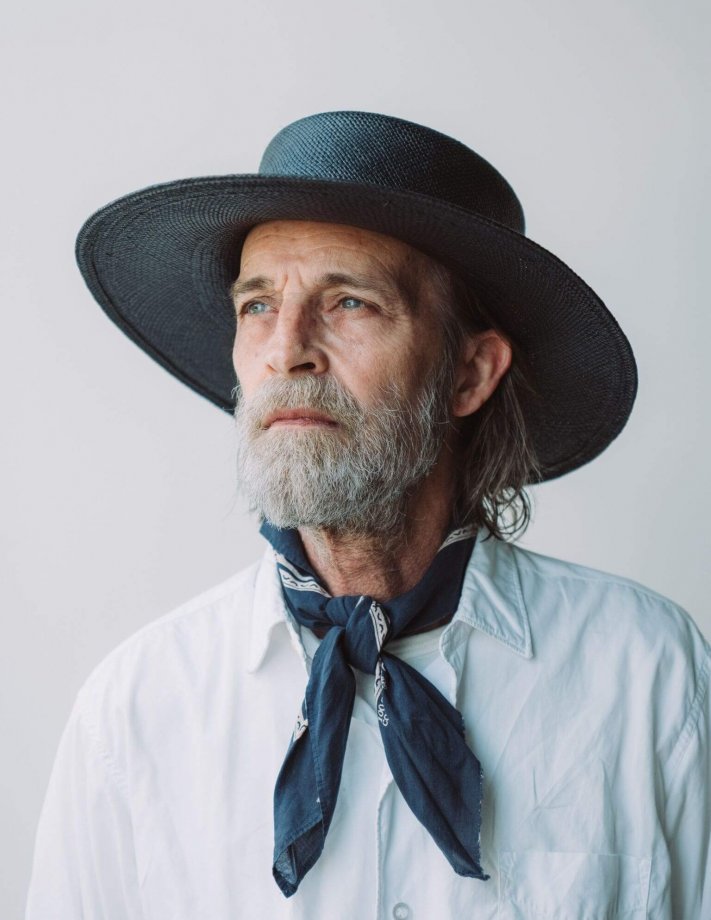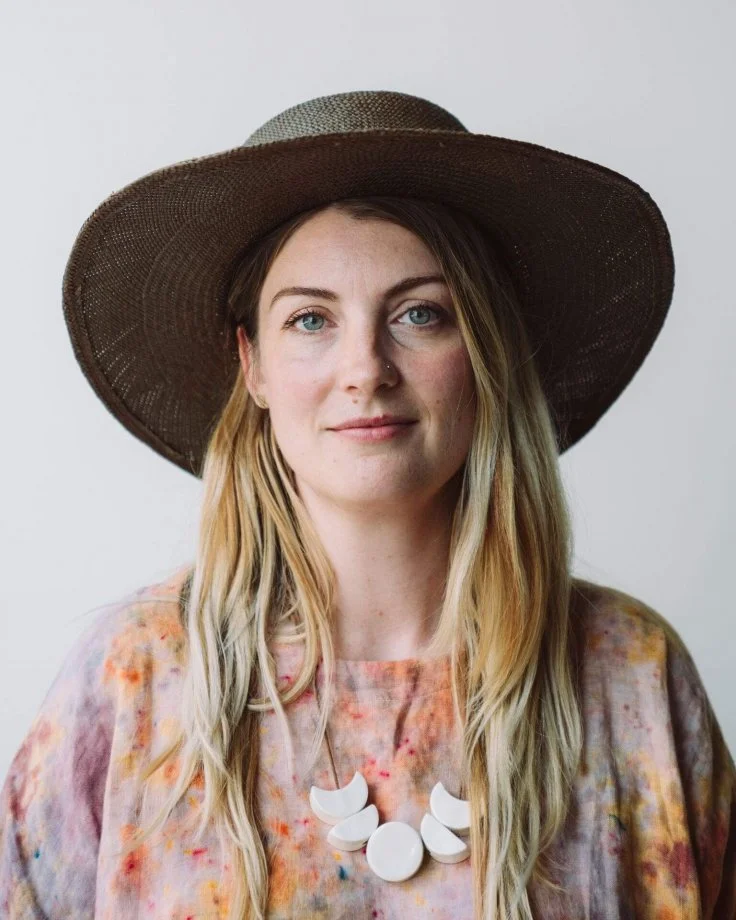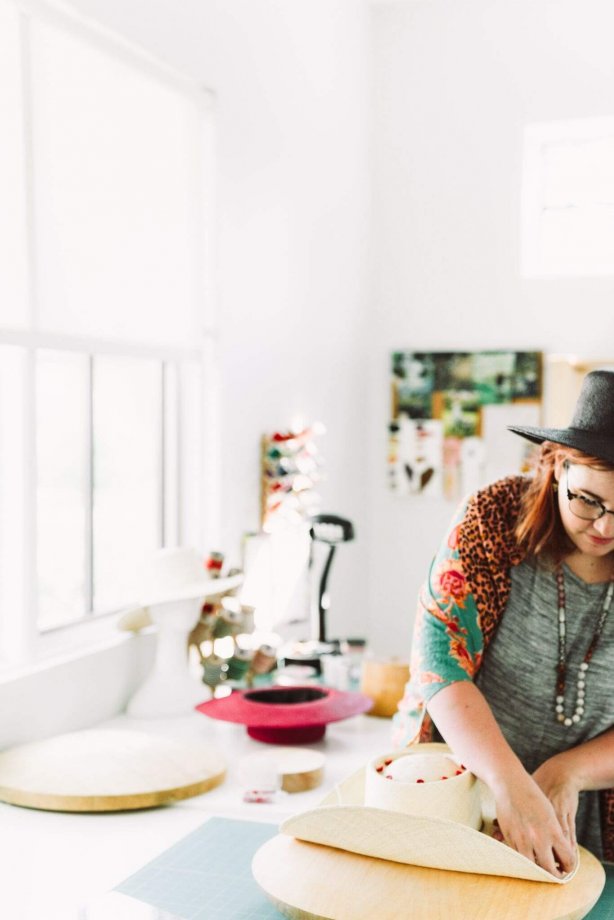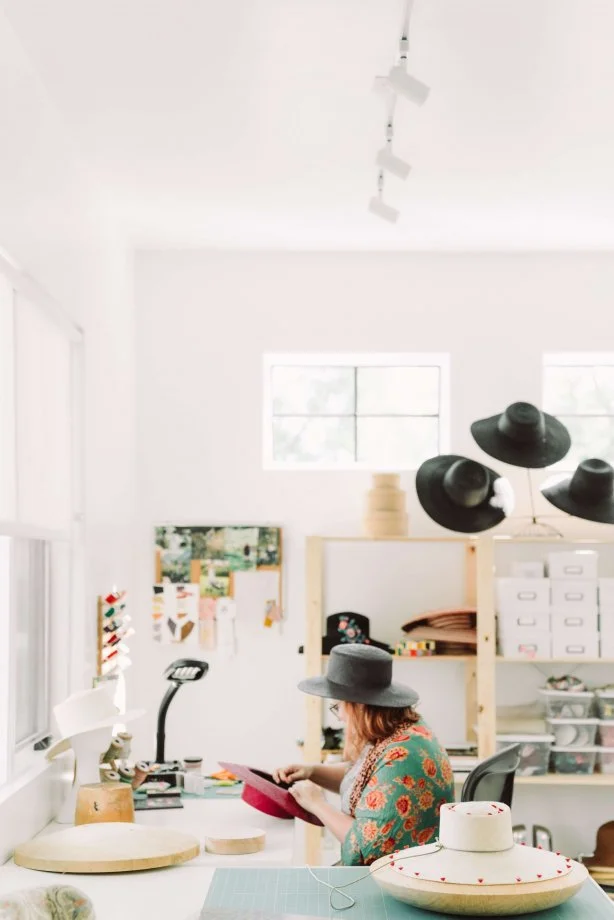Here's Your Hat, What's Your Hurry? A Conscious Creator's Journey from Filmmaking to Family Heirlooms
Here's Your Hat, What's Your Hurry? A Conscious Creator's Journey from Filmmaking to Family Heirlooms
“So my favorite hat when I was a kid was this—and this is so ‘90s, but—it was this denim bucket hat with this denim rose right front and center,” recalls Anna Zeitlin, artisan hatmaker and founder of Fanny & June, chuckling at the memory. “I wore that hat every single day.”
Her laughter is a familiar mix of nostalgia and lighthearted embarrassment—the kind that comes with remembering childhood fashion fixtures of old. Fanny & June, Zeitlin’s Nashville-based line of handmade hats, is in part an ode to a similar idea. Her belief in the timelessness of meaningful personal accessories has always been a foundational part of her vision for Fanny & June, and for Zeitlin, hats are the key.
Still, the idea of actually making hats didn’t enter her mind until she visited “the most beautiful hat shop” in Charleston, South Carolina, while on vacation with her family. There, she says, she fell in love with the artistry and craftsmanship behind the array of hat designs she’d been wearing her entire life.
After college, Zeitlin moved to Los Angeles and put her film degree to use working for a production company—a role that often allowed her time to work on sewing while waiting for files to upload. On a whim, she walked into the renowned Louise Green Millinery & Hats studio and asked if they were hiring. And to her surprise, they were. Zeitlin says she gained indispensable knowledge about the business side of being a professional hatmaker and how to handle the logistics of making and selling artisanal products. And as an added bonus, while working at Louise Green’s iconic brand, Zeitlin had the chance to do everything from creating hats for movie stars to measuring the head of a princess.
In 2011, Zeitlin moved back to Nashville to be closer to family and decided to formally launch Fanny & June as her own artisanal hat label using traditional millinery techniques to give her handmade hats an extra level of elegance and quality. “Part of my journey making hats has been figuring out how to make things that I want to wear rather than focusing on trying to do what other people expect of me,” she explains. “I’ve been the most successful when I’ve made hats just for me and then other people also connect with them.”
Like many crafts and trades that date back centuries, traditional millinery and handmade hat-making processes have become progressively more niche as fast-fashion brands and mass production took over the U.S. fashion market. The difference, Zeitlin says, is in the details. She spends hours hunting for rare fabrics like vintage ribbons or classic veiling made with silk to “incorporate into special, one-of-a-kind pieces.” From hand-stitching her designs where other companies might use glue, to using high-quality vintage materials instead of textiles that mix plastic into the fabric, Zeitlin’s limited-edition hats are made to stand the test of time. “For example, I have these curved irons that are specially made for shaping the silk of the petals for flowers, and you can hand paint each one,” she adds. “The detail and craftsmanship are what makes them unique.”
With such a high level of artistry, it’s easy to assume that Zeitlin—like most major artisanal and couture hat brands around the world—would have her eye on the springtime crescendo of headwear and Southern fashion, the world-famous Kentucky Derby. But between the intense manufacturing pressure to meet client needs leading up to the Derby and her own personal disagreements with horse racing, Zeitlin says the Derby doesn’t align with her vision for Fanny & June. The fact that Derby-goers often buy a new hat every year and never wear it again also conflicts with her own mission to promote sustainable fashion and consciously created art. For Zeitlin, this emphasis on sustainability has an emotional and personal aspect as well.
“I realized that I really wanted to make hats that people can wear every day—hats that become part of who the customer is and how they express themselves,” Zeitlin explains. “I want to make hats that become part of your wardrobe and that you want to wear over and over again and keep for years. And then the hats that are for special occasions—for example, I make some bridal pieces—they become heirlooms you can pass down. You can tell there’s something special about them.”
The attention to enduring craft and quality imbued into Fanny & June comes from her own experience with family heirlooms and artifacts passed down generations. In fact, many of the hats she wore in high school were hats from the 1950s passed down to her from past family matriarchs. “My great-grandmother had a really beautiful black hat that I wore to my grandfather’s funeral,” Zeitlin recalls. “I remember feeling that connection between the generations, and that was really powerful.”
Today, Fanny & June’s silhouettes are fairly minimalist, and there isn’t a lot of added trimming or theatrical decoration—though she does enjoy that process when the opportunity arises. She prefers to keep her designs relatively minimal and very versatile so customers can feel free to find a style that matches their preference while still adding flair to whatever is already in their closet. The majority of her business comes from customers ordering hats from the Fanny & June website, but in keeping with her conscious choices, she also works with clients by appointment in her private studio in Nashville for custom hats and fittings.
“I definitely approach hat-making more as an artisan; I never wanted to mass-produce. I’ve always wanted my hats to be special, limited-edition pieces,” she explains, pausing a moment. “And it’s never been my full-time income. It’s always just been a piece of the puzzle, because I don’t want it to be unsustainable. I’ve had really amazing wholesale partnerships, but I do have to put a limit on them. I want to keep loving it. I don’t want it to ever grow to where it feels like a chore.”
Zeitlin says it’s important for artists and makers to remember there’s absolutely no shame in having another main source of income outside of their specific craft. For Fanny & June, that peace of mind—knowing her needs will be met no matter how finicky the fashion market might be—allows her to bring her fullest creative self to her hat designs and encourages her to take Fanny & June in whatever creative direction she wants to tackle next.
Images courtesy of Attilio D'Agostino.
This story originally appeared in ALIVE magazine, published by Novel.
.









